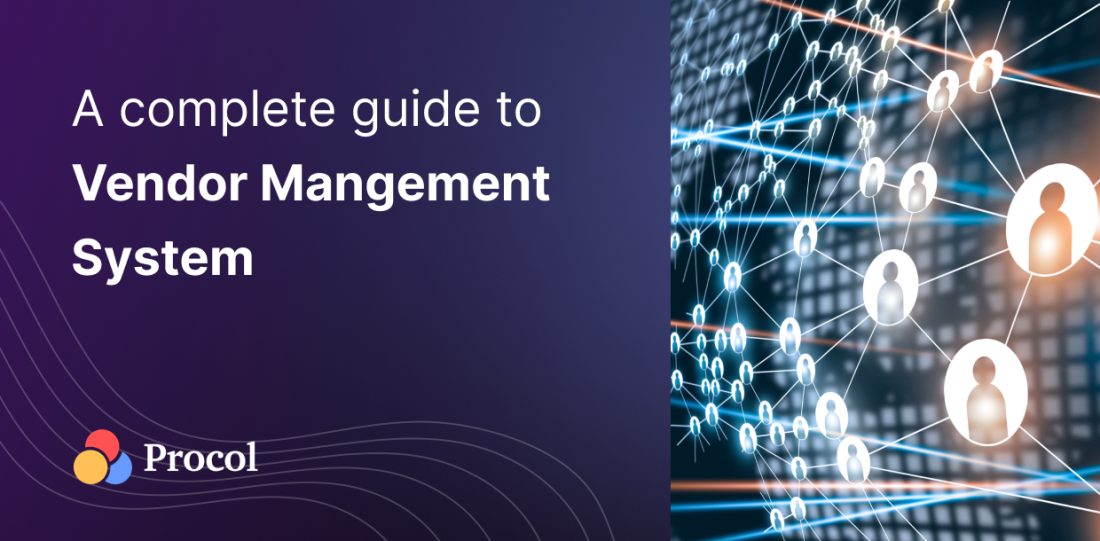A complete overview of Vendor Management System and its benefits

TABLE OF CONTENTS
A vendor management system (VMS) is a web-based platform that serves as a single point procurement software for contact of all vendor-related operations in any organisation or business, enabling increased efficiency and long-term growth at a low cost.
Vendors play an essential role in the procurement process, and it’s crucial to maintain excellent vendor relationships for effective procurement operations. The vendor management process is an important aspect of the procurement system that ensures effective third-party partnerships and reduces supplier risk.
Understanding the Process of Vendor Management
-
Understand each other’s business goals: The first stage is to establish clear business objectives, such as simplifying vendor management to improve efficiency, guaranteeing mutually advantageous contract conditions, and managing and reducing expenses. Setting business goals is mostly used to obtain a thorough grasp of customer and vendor responsibilities.
-
Choosing the right vendors and locating: When selecting a vendor, a thorough review of each vendor is carried out based on experience, quality commitment, resources, and track record. In addition to this, the process of vendor selection must align with corporate objectives and company business goals.
-
Risk Assessment of vendor: In critical indicators, including on-time delivery rates, total yearly cost, and escalated risk evaluations, every vendor candidate should be assessed for compliance and transparency.
-
Negotiations: The buyer should agree on mutually advantageous contract conditions and risk KPIs for performance monitoring. To mutually agree to a deal, it must benefit both the parties involved. The business strategy of the vendor must be studied to provide a better deal agreement for both of them.
-
Onboarding vendors: Companies need to obtain all of the information necessary to process and digitise vendor onboarding/deboarding through procurement software.
Challenges in Managing Vendors
In terms of contract and payment administration, managing a small number of suppliers may require little work. Vendor management for small firms may appear to be a simple operation carried out by the procurement team manually.
Vendor management activities include sourcing and evaluating new vendors, negotiating terms and writing a contract, obtaining collective bargaining agreement, and following invoice payment.
Vendor management requirements grow in lockstep with the extent of a company’s operations. Manual vendor management issues, such as erroneous results, delays in purchase order and invoice clearance, and data inaccuracies, may cost a company a lot of money. An automated system can aid in resolving the aforementioned vendor management difficulties and strengthening vendor relationships that give long-term business advantages.
Benefits of Vendor Management System
-
Better vendor management - In a vendor management system, you can see all your vendor options on a single page. Since businesses get the benefit of a broader number of vendors to choose from, they can effectively bargain and achieve lower prices.
-
Effective contract management - In a multi-vendor environment, the difficulty of maintaining contracts, paperwork, and other critical information in your business is exacerbated by the lack of a vendor management system. A VMS will help you store all your contracts in one place.
-
Performance management - Implementing a vendor management system will give you a complete picture of your vendors’ performance. It will help you analyse the effectiveness of implemented strategies. This, in turn, will aid to shape your efforts to enhance the overall performance of your organisation.
-
Tighter budget controls - Most firms wind up overpaying vendors which causes a negative impact on company financials. A VMS provides your firm with the data and analytics capabilities to figure out if you’re getting the right price for your procured goods/services.
-
Automation - Automation refers to having a user-friendly, integrated, and intelligent digital program throughout your company. With a VMS in place, you can simplify procurement operations such as e-auctions, onboarding/offboarding vendors, performance management, and spend analysis, among others.
Conclusion
Vendor management is a sophisticated field requiring a multi-vendor management system that can handle many vendors in various places. Businesses must use strategic vendor management solutions to ensure a seamless working relationship with vendors.
Procol is a next-generation procurement software that is flexible, user-friendly, cost-effective, and enterprise-grade secure. It offers AI capabilities with unique algorithms that continuously train and improve themselves to help businesses make the correct decision. It can be deployed in under seven days to optimise vendor management for your business. Book your demo today!
Get a Free Demo
We'd love to hear from you. Please fill out this form to schedule a demo with us. You can also give a call on +91 76666 82222



